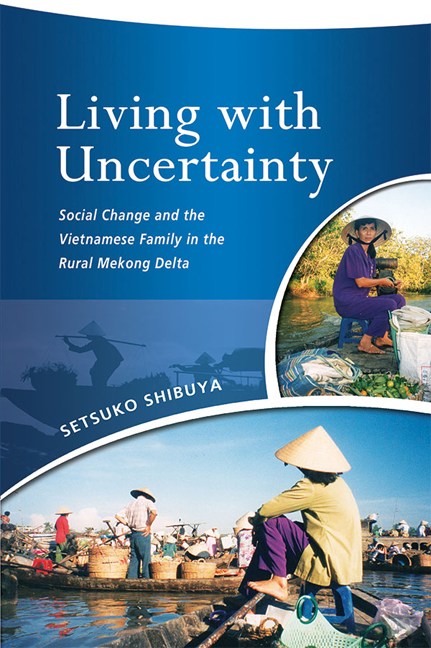Book contents
- Frontmatter
- Contents
- Acknowledgements
- 1 Introduction: Family and Society in Vietnam
- 2 On the Bank of the Mekong River
- 3 Family as the Social Unit
- 4 Farming Together
- 5 Working Outside of the Family
- 6 Education of Children and the Future
- 7 Feeling Poor
- 8 Social Change and the Family in the Rural Mekong Delta
- Bibliography
- Index
- About the Author
- Frontmatter
- Contents
- Acknowledgements
- 1 Introduction: Family and Society in Vietnam
- 2 On the Bank of the Mekong River
- 3 Family as the Social Unit
- 4 Farming Together
- 5 Working Outside of the Family
- 6 Education of Children and the Future
- 7 Feeling Poor
- 8 Social Change and the Family in the Rural Mekong Delta
- Bibliography
- Index
- About the Author
Summary
FAMILY FARMING
It is mid-February 2000 and the rice of Uncle Bay's farm is ready for harvest. One morning the father's children gather to harvest rice on his farm, the first crop of the year. Around six in the morning, Second Brother, Fourth Brother-in-Law, Fifth Brother-in-Law, and Youngest Brother meet in front of Second Brother's thatched house. They take a muddy path through Second Brother's orchards (vuon) and other people's rice fields (ruong) to the field of Uncle Bay and Aunt Tam. There, the four brothers begin to reap the rice rhythmically, holding a bunch of rice in their left hands and a crescent-shaped sickle in their right. A couple of hours later, about a fourth of the whole rice field has been cut in this manner. The sun is already intense by midmorning and the brothers climb onto the dike and drink a few cups of water brought from home while sitting under lemon trees to avoid the sun. When the brothers resume working, Fifth Sister-in-Law, who just returned from the market, joins them. Because of the heat in the open rice fields, the brothers wear Western-style caps and long-sleeved shirts, while the sister wears a Vietnamese conical hat and a long-sleeved blouse. In the afternoon, after the brothers and sister return home for lunch, Uncle Bay joins them to supervise the field. Aunt Tam also puts on her conical hat and comes out to the rice field to help for a few hours. This is a job the whole family takes part in. Around four o'clock in the afternoon, after a day's work all the rice from Uncle Bay's four thousand square metre rice field has been reaped.
The reaped rice is left in the field for two or three days to dry. When the rice is dried, the same family members spend another morning collecting it. A few bundles of rice are first gathered into larger bundles, which the brothers and sisters then carry on their shoulders to the centre of the rice field. When all the rice has been gathered there, they wrap it in plastic sheets and take each wrapping to the gardens in front of their homes, again on their shoulders.
- Type
- Chapter
- Information
- Living with UncertaintySocial Change and the Vietnamese Family in the Rural Mekong Delta, pp. 88 - 120Publisher: ISEAS–Yusof Ishak InstitutePrint publication year: 2015

